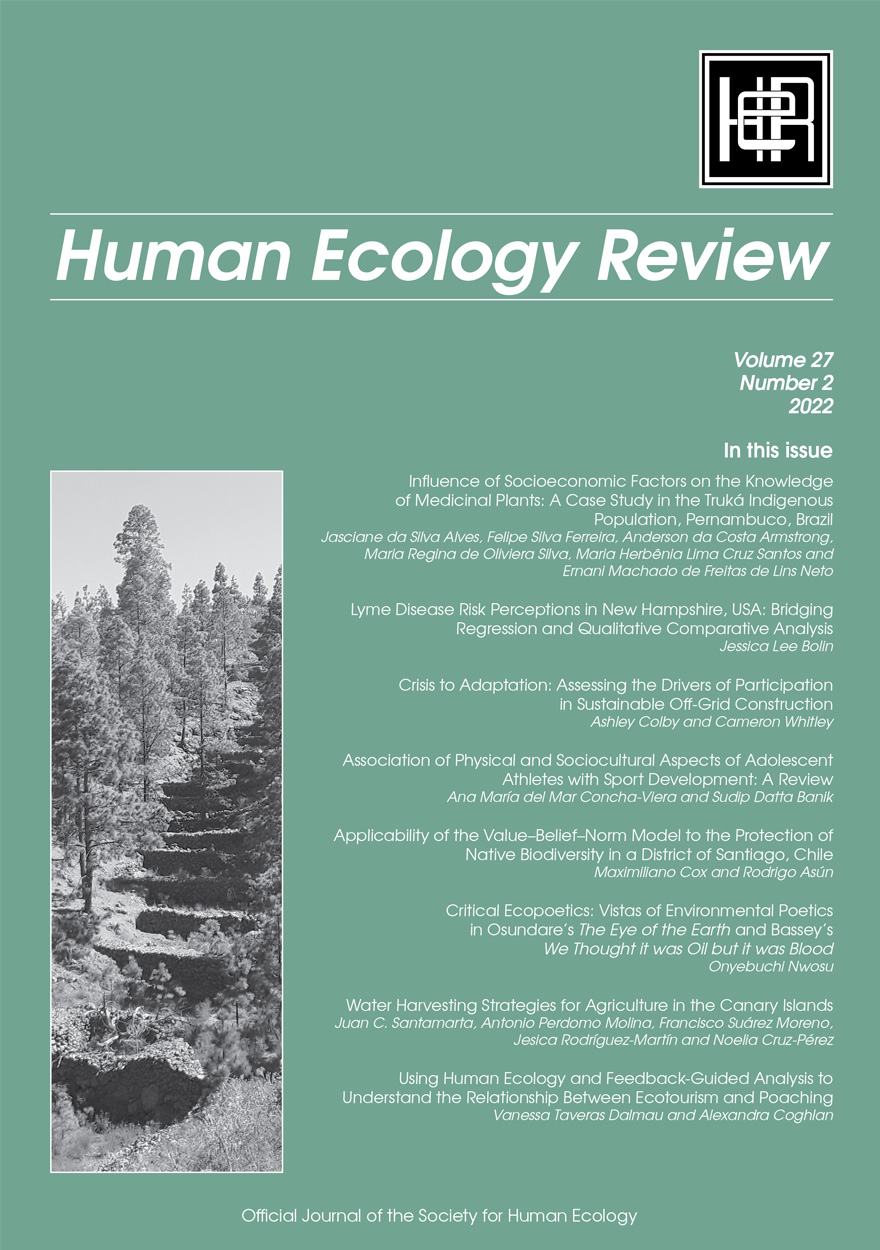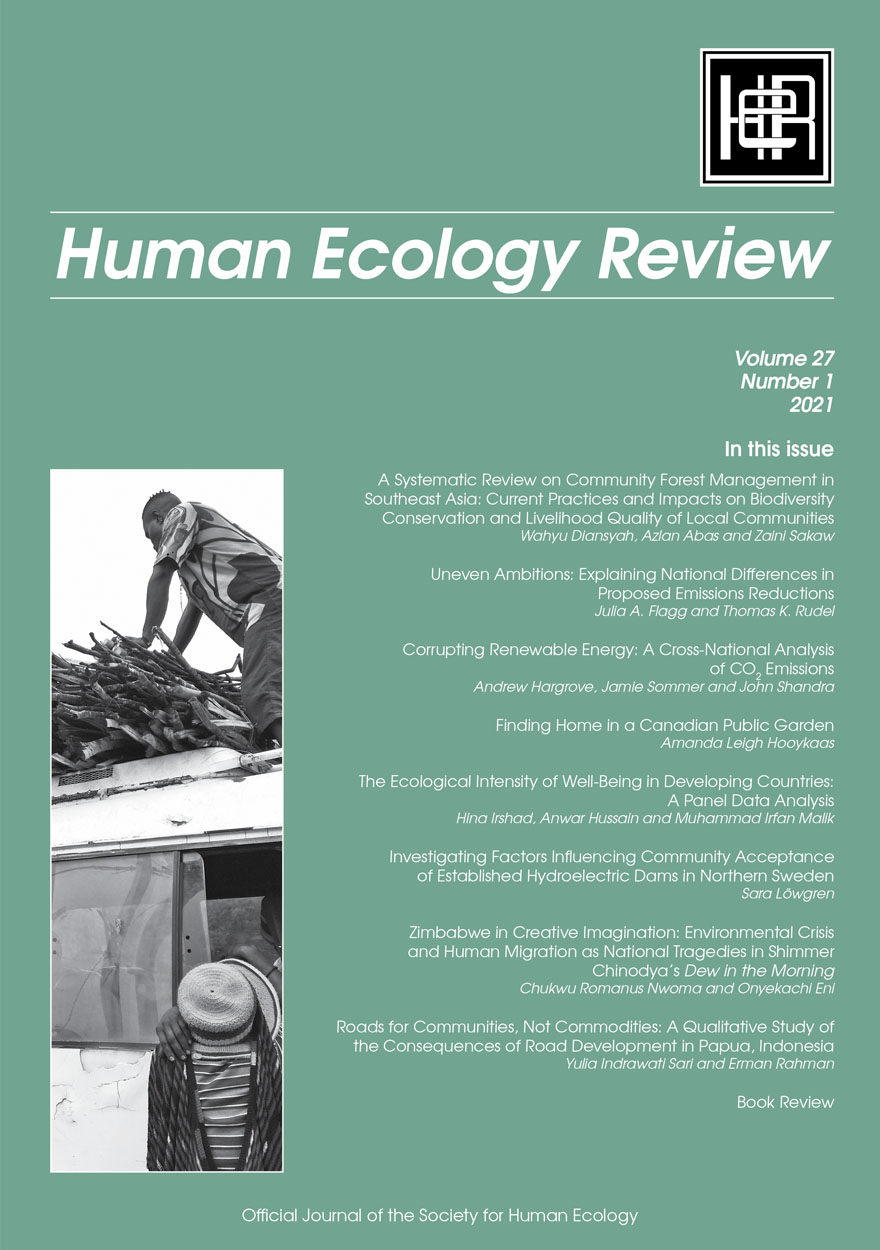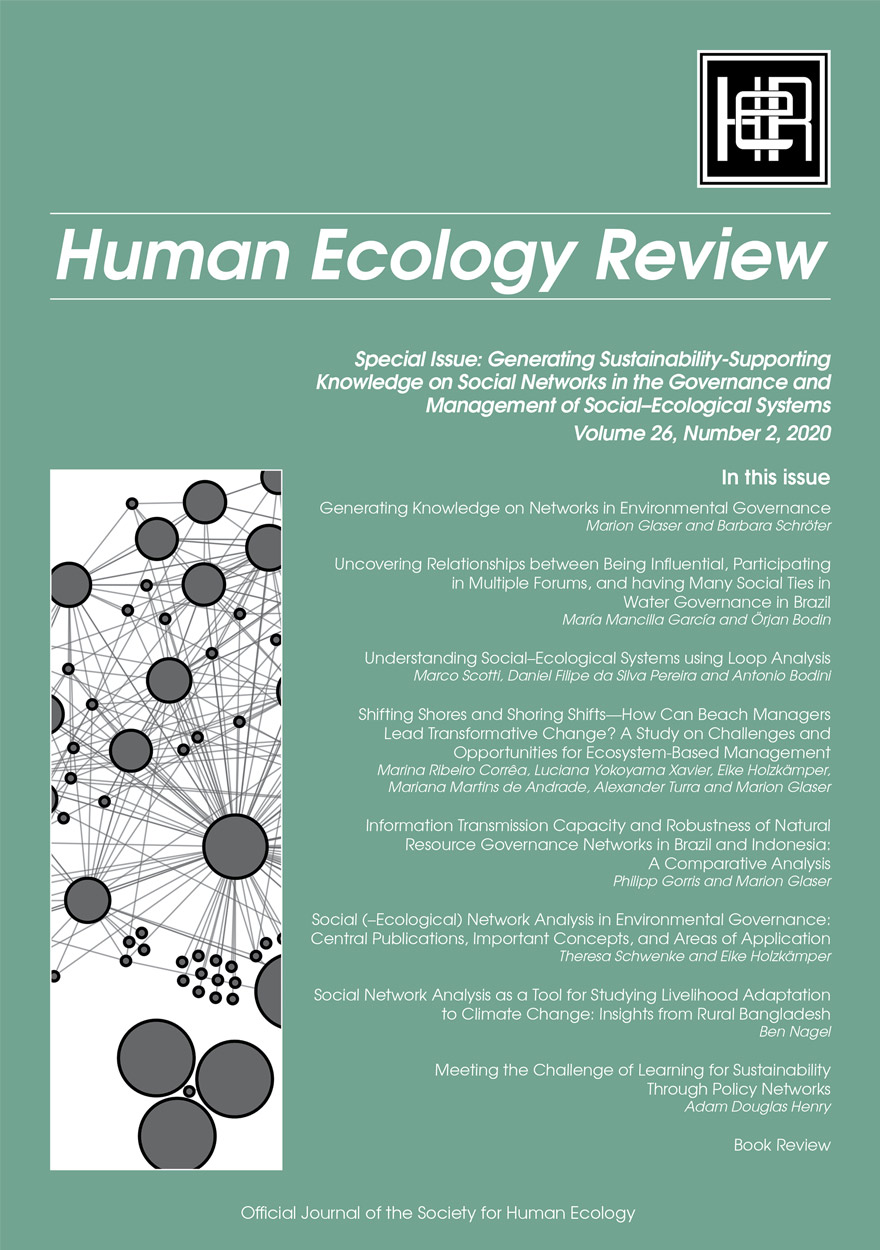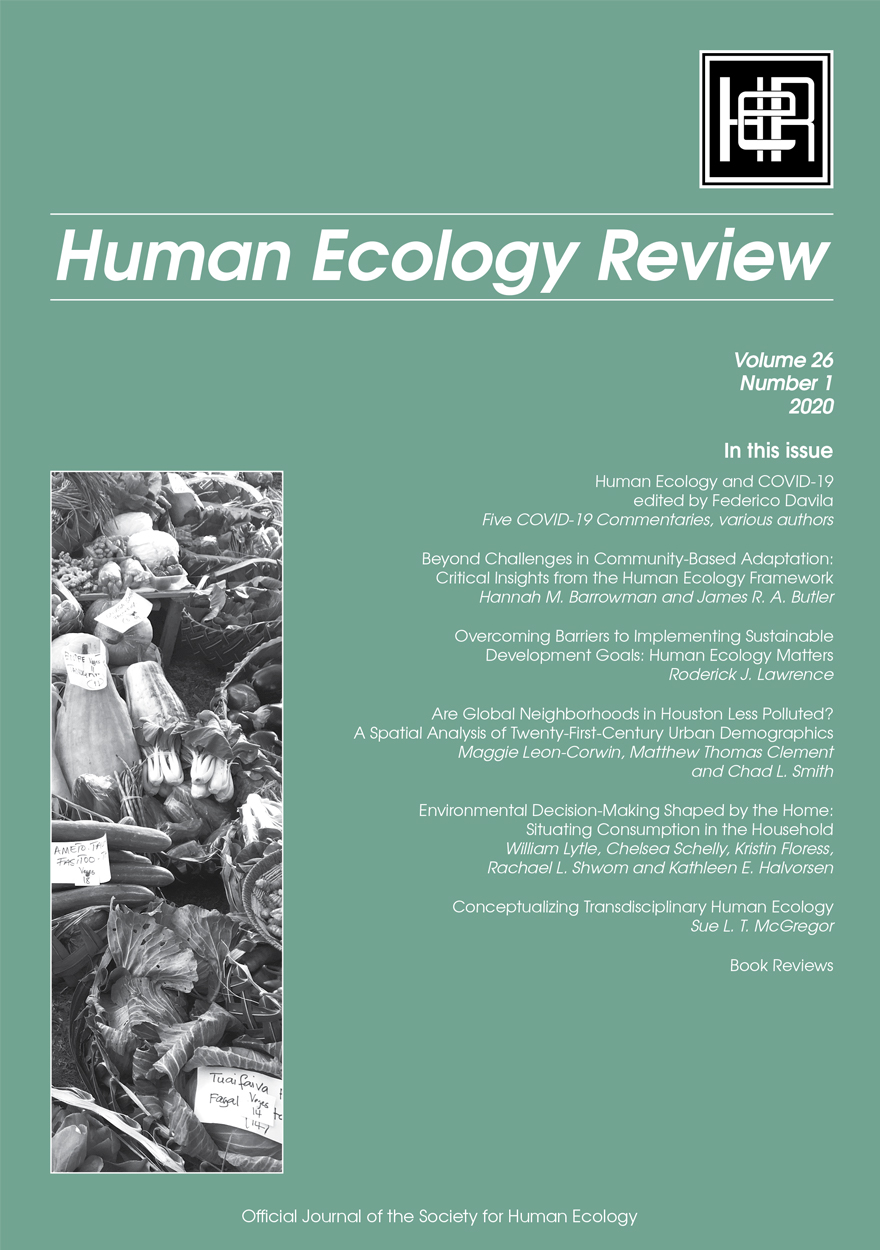Search titles
Displaying results 11 to 20 of 103.

Human Ecology Review: Volume 27, Number 2 »
Publication date: December 2022
Human Ecology Review 27(2) features contributions from researchers from around the world, including Brazil, the United States, Mexico, Chile, Australia, Uruguay, Spain, and Nigeria. Studies presented include the indigenous Truká people’s knowledge of medicinal plants in Pernambuco, Brazil (Alves et al.); perceptions of Lyme disease risk in New Hampshire, USA (Bolin); social and physical aspects of adolescent sport development (Concha-Viera and Datta Banik); the role of ecopolitics and ecopoetics in promoting environmental concerns about and resistance to oil exploration in Africa (Nwosu); traditional water harvesting and conservation in arid regions of the Canary Islands (Santamarta et al.); feedback-guided analysis of ecotourism and poaching in the Dominican Republic (Taveras Dalmau and Coghlan); motivations for participation in off-grid ecovillages, featuring a case study from Uruguay (Colby and Whitley); and biodiversity protection in Santiago, Chile (Cox and Asún).
Download for free
Not available for purchase

International Review of Environmental History: Volume 8, Issue 1, 2022 »
Edited by: James Beattie, Brett Bennett
Publication date: March 2022
This timely special issue of the International Review of Environmental History focuses on animals and epidemics in modern East Asia. The global pandemic of Covid-19 has forced us to think more deeply about the interrelations between animals, both human and non-human, and epidemics. Moreover, the intense attention on East Asia in this context demands that we study the region in the thematic matrix of health, environment, animals, sociocultural traditions, and geopolitics. This collection comprises two parts. The first part consists of three research articles and an extensive commentary. The articles examine, respectively, rabies and rabid dogs in early twentieth-century China, venomous snakes and tropical medicine in colonial Taiwan, and epidemics and animal rights movements in contemporary China. The second part includes three reflective essays on topics of immediate relevance: animals and health campaigns in Mao-era China; insects, particularly silkworms, in vaccine research; and the dominant but flawed scientific paradigm of emerging zoonotic epidemics. The essays are followed by a broad commentary that provides a global and comparative perspective.
Download for free
Not available for purchase

Georges River Blues »
Swamps, Mangroves and Resident Action, 1945–1980
Authored by: Heather Goodall
Publication date: February 2022
The lower Georges River, on Dharawal and Dharug lands, was a place of fishing grounds, swimming holes and picnics in the early twentieth century. But this all changed after World War II, when rapidly expanding industry and increasing population fell heaviest on this river, polluting its waters and destroying its bush.
Local people campaigned to defend their river. They battled municipal councils, who were themselves struggling against an explosion of garbage as population and economy changed. In these blues (an Australian term for conflict), it was mangroves and swamps that became the focus of the fight. Mangroves were expanding because of increasing pollution and early climate change. Councils wanted to solve their garbage problems by bulldozing mangroves and bushland, dumping garbage and, eventually, building playing fields. So they attacked mangroves as useless swamps that harboured disease. Residents defended mangroves by mobilising ecological science to show that these plants nurtured immature fish and protected the river’s health.
These suburban resident action campaigns have been ignored by histories of the Australian environmental movement, which have instead focused on campaigns to save distant ‘wilderness’ or inner-city built environments. The Georges River environmental conflicts may have been less theatrical, but they were fought out just as bitterly. And local Georges River campaigners – men, women and often children – were just as tenacious. They struggled to ‘keep bushland in our suburbs’, laying the foundation for today’s widespread urban environmental consciousness.
Cover: Ruth Staples was a courageous Georges River campaigner who lived all her life around Lime Kiln Bay at Oatley West. She kept on fighting to regenerate the river until her death, aged 90, in 2020.

Human Ecology Review: Volume 27, Number 1 »
Publication date: December 2021
This volume of Human Ecology Review represents an internationally diverse range of human ecology research and practice. Diansyah, Abas, and Sakawi present a review of community forest management in Southeast Asia and its impacts on biodiversity conservation community livelihoods. Flagg and Rudel survey national differences in proposed greenhouse gas emission reductions and relative levels of fossil fuel dependencies. On a similar topic, Hargrove, Sommer, and Shandra link national levels of CO2 emissions to levels of executive and public sector corruption, with consequences for transitioning to renewable energy economies. Hooykaas provides a Canadian place-based case study of the role of public gardens in developing a sense of being ‘at home’. Irshad, Hussain, and Malik analyse the ecological intensity of different levels of well-being across a number of developing countries. From Sweden, Löwgren explores a range of factors that encourage or reduce community acceptance of hydroelectric power generation. Nwoma and Eni provide a fascinating discussion on the interconnectedness between literature and Zimbabwe’s environmental crisis. Finally, Sari and Rahaman give us a study of the community impact of road development in Papua, Indonesia.
Download for free
Not available for purchase

International Review of Environmental History: Volume 7, Issue 2, 2021 »
Edited by: James Beattie
Publication date: November 2021
The second issue of International Review of Environmental History for 2021 features contributions on limpets and global environmental history, US bird conservation, soyabean agriculture in South America, settler environmental change in Aotearoa New Zealand, woodlands, communities and ecologies in Australia, and irrigation and agriculture in Australia.
Download for free
Not available for purchase

The Absent Presence of the State in Large-Scale Resource Extraction Projects »
Edited by: Nicholas A. Bainton, Emilia E. Skrzypek
Publication date: August 2021
Standing on the broken ground of resource extraction settings, the state is sometimes like a chimera: its appearance and intentions are misleading and, for some actors, it is unknowable and incomprehensible. It may be easily mistaken for someone or something else, like a mining company, for example.
With rich ethnographic material, this volume tackles critical questions about the nature of contemporary states, studied from the perspective of resource extraction projects in Papua New Guinea, Australia and beyond. It brings together a sustained focus on the unstable and often dialectical relationship between the presence and the absence of the state in the context of resource extraction. Across the chapters, contributors discuss cases of proposed mining ventures, existing large-scale mining operations and the extraction of natural gas. Together, they illustrate how the concept of absent presence can be brought to life and how it can enhance our understanding of the state as well as relations and processes forming in extractive contexts, thus providing a novel contribution to the anthropology of the state and the anthropology of extraction.
‘The Absent Presence fills a major gap in our knowledge about the relationship between states and companies – at a time when resource extraction seems to be more contested than ever. Bainton and Skrzypek have curated an incredibly impressive volume that should be read by all those interested in exploring corporate and state power, and the ever-present impacts of extraction. A highly recommended read.’
— Professor Deanna Kemp, Director of the Centre for Social Responsibility in Mining, The University of Queensland
‘Countless books have been written on the sovereign state and how it imposes a particular kind of order on economic and social interactions. What is original and compelling about this collection is the portrait of how two very different states converge when it comes to “extractive ventures”. From the presumption of exclusive sovereignty over mineral resources, to the bargains that are struck with major (often global) corporations, and the relative indifference to environmental impacts, there is a remarkable consistency in the patterns that are referred to as “state effects”. These effects are brought from the background to the foreground in this book through the blending of creative and critical thinking with detailed empirical research.’
— Tim Dunne, Pro-Vice-Chancellor and Professor of International Relations, The University of Queensland
‘This brilliant and intriguing title provides a timely contribution to understanding the actual functions and strategies of state (and state-like) institutions in resource arenas. The dialectics of presence-absence and its refractions at different levels and scales of government allow the authors to go beyond stereotypes about the (strong, weak, failed or corrupt) state, highlighting more commonalities than expected between Papua New Guinea and Australia, and even New Caledonia.’
— Dr Pierre-Yves Le Meur, Anthropologist, Senior Researcher, French National Research Institute for Sustainable Development, Joint Research Unit SENS (Knowledge Environment Society)

Human Ecology Review: Volume 26, Number 2 »
Publication date: July 2021
This volume is a special issue on ‘Generating Sustainability-Supporting Knowledge on Social Networks in the Governance and Management of Social–Ecological Systems’, compiled by guest editors Marion Glaser and Barbara Schröter. The collection of papers demonstrates the capacity of social network analysis to contribute to understanding the interactions of actors and institutions. María García and Örjan Bodin set out to differentiate to what extent power resides within network structures and whether it is rooted in actor attributes such as class and wealth. Marco Scotti, Daniel Pereira, and Antonio Bodini present loop analysis as a qualitative tool for linking disciplinary domains in integrated analyses of the natural and social science variables. Marina Corrêa and her co-authors examine the role and potential of public sector managers for advancing the ecosystem service-oriented management of the social–ecological systems. Philipp Gorris and Marion Glaser focus on the information transmission capacity and the robustness of actor networks in different approaches to collaborative governance of coastal and marine natural resources. Theresa Schwenke and Eike Holzkämper present a bibliometric analysis of publications that address both environmental governance and social (–ecological) network analysis. Ben Nagel presents a coastal case study from Bangladesh, one of the countries most vulnerable to climate change. The collection is rounded out by Adam Henry, who focuses on sustainability learning at the organisational level, addressing to what extent an organisation’s position in a larger environmental policy network determines learning outcomes.
Download for free
Not available for purchase

International Review of Environmental History: Volume 7, Issue 1, 2021 »
Edited by: James Beattie, Ruth Morgan, Margaret Cook
Publication date: June 2021
Arising from the ‘Placing Gender’ workshop held in Melbourne in 2018, this collection brings together contributions that demonstrate different approaches to undertaking gender analysis in environmental history. Focusing on non-Indigenous women and men in the Anglo-world from the mid-nineteenth century, some adopt new tools to excavate familiar terrain, while others listen closely to voices that have rarely been heard in the field. This issue argues that recasting the making of settler places in terms of their gendered production and experience not only enriches their own environmental history, but also broadens the historian’s enquiry to encompass the other lands implicated in the production of settler places.
Download for free
Not available for purchase

Human Ecology Review: Volume 26, Number 1 »
Publication date: April 2021
Human Ecology Review is a semi-annual journal that publishes peer-reviewed interdisciplinary research on all aspects of human–environment interactions (Research in Human Ecology). The journal also publishes essays, discussion papers, dialogue, and commentary on special topics relevant to human ecology (Human Ecology Forum), book reviews (Contemporary Human Ecology), and letters, announcements, and other items of interest (Human Ecology Bulletin). Human Ecology Review also publishes an occasional paper series in the Philosophy of Human Ecology and Social–Environmental Sustainability.
Download for free
Not available for purchase

Cooperative Evolution »
Reclaiming Darwin’s Vision
Authored by: Christopher Bryant, Valerie A. Brown
Publication date: March 2021
Cooperative Evolution offers a fresh account of evolution consistent with Charles Darwin’s own account of a cooperative, inter-connected, buzzing and ever-changing world. Told in accessible language, treating evolutionary change as a cooperative enterprise brings some surprising shifts from the traditional emphasis on the dominance of competition.
The book covers many evolutionary changes reconsidered as cooperation. These include the cooperative origins of life, evolution as a spiral rather than a ladder or tree, humans as a part of natural systems rather than the purpose, relationships between natural and social change, and the role of the individual in adaptive radiation onto new ground. The story concludes with a projection of human evolution from the past into the future.
‘Environmental studies courses have needed a book like Cooperative Evolution for a long time. It is a boon for those teaching the complexity of the evolutionary story.’
— Dr John A. Harris, BSc(Hons) MSc PhD, School of Environmental Science, University of Canberra
‘As a regenerative, holistic-thinking farmer I daily witness the results of cooperative evolution as the seasons unfold. A pleasure to read, Cooperative Evolution gives entry to recent thinking on evolutionary processes.’
— David Marsh, MSA, ‘Allendale’, Boorowa, New South Wales, 2018 National Individual Landcarer Award recipient
‘This book is an engaging new look at ideas about evolution as we know it today. In the hands of two eminent biologists, it presents an approachable yet challenging argument. I heartily recommend it.’
— Emeritus Professor Sue Stocklmayer AO, BSc MSc PhD, Centre for the Public Awareness of Science, The Australian National University



